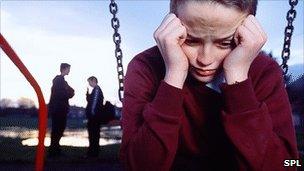Mental health: are we all sick now?
- Published
Diagnosing psychiatric illness has always been controversial, mental health experts say. Now some are worried that a new draft of the diagnostic 'bible' for mental health medicine could result in almost everyone being diagnosed with a mental condition.

Doctors are particularly concerned about "depressed" children being over-treated
The diagnostic 'bible' in question is the Diagnostic and Statistical Manual of Mental Disorders, published by the American Psychiatric Association.
The US manual is used worldwide as a basis for diagnosis, research and medical education.
Its forthcoming fifth edition - known in the profession as as DSM-5 - is set to contain a range of new diagnoses, including conditions such as "mixed anxiety depression, psychosis risk syndrome and temper dysregulation disorder", as well as the more mundane binge eating.
The danger, say experts writing in a special issue of the Journal of Mental Health, external, is that there has not been enough research to back up these changes.
Even the smallest shift in how to define something like depression could have huge implications.
Self-fulfilling
Dr Felicity Callard, senior research fellow at the Institute of Psychiatry, King's College London, says it is crucial to understand what happens when people are over-diagnosed.
"There are very big potential implications on how people, particularly adolescents, respond to being told they have a mental illness. It's likely there will be harmful consequences," she said.
She cites the "at risk psychosis syndrome" diagnosis as an example of a label which is given to young people who 'might' have psychosis - characterised by abrupt changes in personality. It is a diagnosis of something which could result in a disorder, but only potentially. That can have complicated effects, she says.
"Imagine a young person being told that they are "at risk" of developing a mental illness. How would that affect that individual's behaviour? Could it lead to increased stigma or even discrimination? And how might it affect the parents and family of that person too?"
Jerome Wakefield of New York University's Department of Psychiatry writes: "One of the most frightening scenarios is the potential for medicating people - particularly children - who haven't yet shown any signs of illness in a bid to 'treat' them."
These concerns are shared by a number of clinical experts in the Journal of Mental Health.
The journal's editor, Professor Til Wykes of King's College London, fears that, "most of these changes {to the manual} imply a more inclusive system of diagnoses where the pool of normality shrinks to a mere puddle."
If normal behaviour is increasingly being categorised as mental illness then that creates a burden on individuals, families and on society as a whole.
As well as an emotional and social toll, there are financial implications.
It follows that money has to be set aside to care for the mentally ill and clinicians and carers have to be trained to deal with their 'illness'.
Making sense
Yet some effective system of diagnosis is still needed.
Nick Craddock, professor of psychiatry at Cardiff University, feels it is important to make sense of a person's experience using a classification system like the DSM.
"Diagnosing Bipolar disorder, for example, can be very helpful. It can transform people's lives, make them feel accepted and can give their symptoms meaning," he said.
Previous research has shown that many people enjoy having a label or a name to describe their symptoms. With diagnosis comes relief and it can also be a form of therapy in itself.
Following changes to the previous version of the DSM, there was a rise in rates of attention deficit hyperactivity disorder, autistic disorder and childhood polar disorders.
The Journal calls them "false positive epidemics".